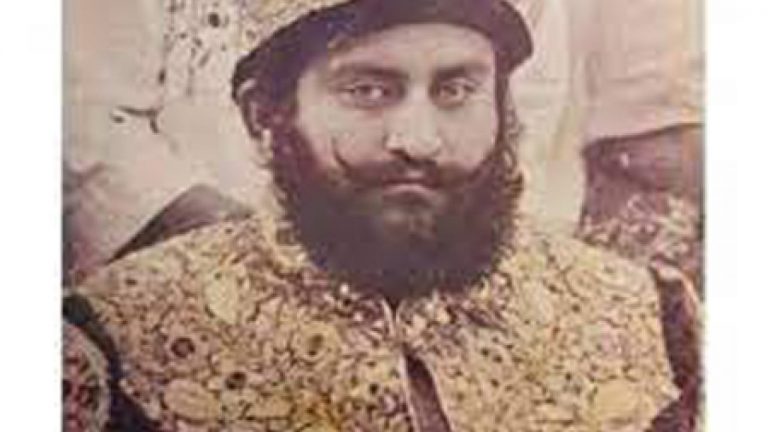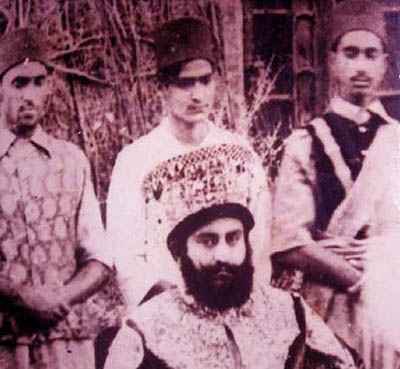
“Embracing the martyrdom following the path of truth and righteousness is the tradition of my ancestors; and therefore I will go to the gallows smilingly considering it our religious trait. We are not born to become slaves, and it is the goal of our life to break the chains of slavery,” Pir Sahib had said.
Nasir Aijaz
Pir Sibghatullah Shah Rashdi-II, who fought against the British colonial forces and was sentenced to death by a military court, passed his last days of life in death cell with all dignity, and even at the time of execution, which the Viceroy of India Lord Linlithgow himself admitted in the last part of his 1st April letter. He had remarked: “I gather that the Pir behaved with dignity at the time of his execution.”
During his confinement in death cell at Hyderabad, Pir Sahib would pray most of the time at night offering prayers, and would sleep in late hours. A British officer, probably Mr. Cooper, used to visit him and played Chess with Pir Sahib and always lost the game. On the night before the Pir was put to gallows; the same officer came intentionally to defeat the Pir Sahib, as he thought the Pir would be under severe stress due to death sentence, and would surely lose the game, but to his utter surprise, Pir Sahib played with complete peace of mind and defeated the officer. “Embracing the martyrdom following the path of truth and righteousness is the tradition of my ancestors; and therefore I will go to the gallows smilingly considering it our religious trait. We are not born to become slaves, and it is the goal of our life to break the chains of slavery,” Pir Sahib told the stunned officer.
Muhammad Usman Deeployee too has narrated the account of 19th March night when Pir Sahib played Chess with British officer. He however mentions name of that officer as Kargil, who was a little bit late.
My friend, why you are late today? Pir Sahib asked smilingly. There was no sign of any tension on his face. Observing his tranquil style, Kargil said: “You are still in a mood to play Chess on the last night of your life?”
“My friend, the life is not trustworthy. And you know every night is considered the last one in the journey, which I have chosen, so it makes no difference if we played the Chess,” Pir Sahib replied with same calmness.
They played till midnight. Kargil thought that Pir Sahib’s calmness was not the natural, but the way Pir Sahib played and defeated him, negated his opinion.
While leaving, Kargil felt very sad and taking a paper out of his pocket, requested Pir Sahib to sign it if he considered him a friend. Pir Sahib replied looking at the paper: “Keep it in your pocket my friend. The persons seeking mercy cannot launch such movements.”
Kargil, not certain about such a peace of mind of Pir Pagaro, didn’t leave the jail premises, and returned to watch secretly what Pir Sahib does. He was sure Pir Sahib couldn’t sleep in tension, as after few hours, he was to be taken to the gallows, but to his surprise, Pir Sahib offered prayers and slept as usual, and exactly at 4a.m he woke up, took bath, offered prayers and while reciting Quran, the jail staff came to take him, and he left the death cell smilingly for the hanging platform.
Kargil, who watched the Pir Sahib all the time till he embraced martyrdom, felt great respect for him. “My honorable friend, a country that gives birth to such lions, cannot remain a slave for longer time,” he said saluting the body of Pir Sahib.
Kargil remembered Pir Sahib’s words, which he said during one of his daily sittings: “From the day one, I hated the imperialism that had enslaved us. I had refused to accept your rewards, titles and appreciation letters. I marched forward slow and steady facing all the hardships, and organized the Ghazi Force. My ultimate goal was ‘Freedom or Death’ and ‘Motherland or Coffin’.
 The Khalifas and other selected disciples, who were called to see that their spiritual leader is dead now, didn’t believe, as even after death, his face looked as if he was alive. They thought, the Pir Sahib, whose body was put on a chair with his traditional costume of a Pir, was intoxicated by the authorities. For several years, it was generally considered that Pir Sahib had been deported to some African country or at some island.
The Khalifas and other selected disciples, who were called to see that their spiritual leader is dead now, didn’t believe, as even after death, his face looked as if he was alive. They thought, the Pir Sahib, whose body was put on a chair with his traditional costume of a Pir, was intoxicated by the authorities. For several years, it was generally considered that Pir Sahib had been deported to some African country or at some island.
When, in January, the Pir Sahib was brought from Seoni jail of India to Hyderabad jail, Lambrick, accompanied by his assistant Kargil and some other officers, had come to the death cell where he saw him sitting without any strain and anxiety. Lambrick came close to Pir Sahib expecting that he will rise and shake hand, but Pir Sahib just extended hand sitting at the chair. “Pir Sahib, the visitors are always welcomed,” Lambrick said with a smile on his face.
“But you are not the visitor. You are the man who has come to meet and impress a rebellion, confined with deception,” Pir Sahib replied.
“Even then you must respect the visitors,” Lambrick said.
“It will create a doubt on my being the Hussaini (descendent of Imam Hussain martyred at Karbala) if I developed a slight respect for an imperialist,” Pir Sahib replied.
Feeling embarrassed, Lambrick then turned to other topic justifying the British actions but the Pir Sahib negated him with strong arguments. When the Lambrick said lamenting that Hurs derailed Lahore Mail to eliminate Allah Bux Soomro and Nahchaldas but several innocent passengers were killed, Pir Sahib replied in a serious tone: “Mr. Lambrick, your government had launched propaganda to give such a wrong impression through the newspapers, but the fact is that the Hurs didn’t intend it.”
“Then what they had planned?” asked the Lambrick but didn’t like to discuss those matters in presence of other people and changed the topic.
Same night, at around 10, Kargil, the Lambrick’s assistant, came alone to see the Pir Sahib. He ordered the guard to unlock the Cell and move away. “Pir Sahib, would you allow me to come in considering me a friend?” Kargil sought permission. Pir Sahib rose smilingly and replied: “Friendship is a far off thing, but I would welcome if you have come with sense of humanity.”
After hand shake, Kargil said: “I am anxious to know the actual plan of Hurs behind removing the fishplates that derailed Lahore Mail.”
Pir Sahib smiled: “Yes, derailment was the actual plan, but not for the Lahore Mail.”
“Then which one,” Kargil said.
“That one which was to transport troops and weaponry to the Makhi area to destroy it, but unfortunately its engine failed and ill-fated Lahore Mail departed earlier than it. The Hurs immediately boarded the train and warned the driver but by then the train had reached at that place,” Pir Sahib told.
Kargil was taken aback. “And what about enrolling the Ghazis to wage a war against British?”
“Yes, we did it, and it was not a secret. We openly recruited the Ghazis to fight for the motherland. It was not a band of robbers.”
After some time, Pir Sahib said: ‘Now leave such serious issues. Do you like playing Chess?”
“Oh, it’s my favorite game,” he told and then they had been playing the Chess daily till the last night of his life.
But the British authorities under a plan spread rumors of Pir Sahib, the man of strong nerves, that he might commit suicide after the military court announces its verdict. According to Special Branch record, the directives were issued on 23rd February to spread such rumors. After that, directives were issued on 27th February to deploy three special guards that would be performing round the clock in shifts to ensure that Pir Sahib doesn’t commit suicide, and to prevent him in case of doing so. The special guards were Longman, Irvin and Corporal Haig. The plan of spreading such rumors was aimed to terrorize the Hurs by giving impression that their spiritual leader was so afraid that he might commit suicide anytime. The copies of these directives were also sent to Commissioner of Police, Inspector General of Jails, Martial Law Administrator, and Brigade-Major of Upper Sindh Force and also to the Lambrick.
Pir Sahib had prohibited smoking for all his disciples but during his confinement at Hyderabad jail, he used to enjoy cigar. When he was taken to the gallows on March 20, 1943, Pir Sahib laughed and prayed to Allah “O my lord, forgive me for having committed the sin of smoking (Cigar)”.
__________________
Excerpt from the book ‘Hur – The Freedom Fighter’, authored by senior journalist Nasir Aijaz. The book, published by Sindh Culture Department in 2015, is available at its bookshop in Karachi.